- Home
- Beverley Harper
Storms Over Africa Page 5
Storms Over Africa Read online
Page 5
And so he sought the company of some of his former comrades from the War of Independence.
The men who had fought in the war, black and white alike, had earned a reputation as being the best, the fiercest and the most effectively deadly soldiers in the world. But some of these men had not been able to readapt when the war ended. The whites had fought an increasingly bitter war. Most of them had lost someone dear to them. They returned to their old lives with their nerves stretched as taut as any violin string. For some, only alcohol dulled their battered senses. Only getting falling-down, legless, motherless drunk night after night helped them forget their loved ones, and the sour taste of defeat in a war they believed they should have won.
Richard avoided friends who had returned to their families after the war and picked up their lives where they left off. He felt at home in the company of men who were hurting. Nursing his own grief, he could identify with the bitter disappointment in others. He devoted more and more time to an almost hysterical need to party. He drank until he fell into a stupor. He bedded any woman who happened across his path. He shut the door on grief, love and fatherly responsibility. He told himself he was having fun.
The farm suffered. His infallible instinct at cattle sales was dulled by hangovers. His zest for getting stuck into hard work alongside his African labourers went the same way, leaving him apathetic and short-tempered. Without his enthusiasm and good humour, his workers stopped trying. Fences sagged, fields were overgrazed, soil erosion began a sinister creep along some of his land.
His accountant jerked him out of his self-pitying apathy by bluntly pointing out that Richard owed so much money it would take the farm, on full production, five years to pay it back. He recommended selling. Appalled, Richard looked around for ways to save his farm. But when he saw how badly he had allowed it to run down he realised the task was probably beyond him. His money was gone, his stock was non-existent and a bank loan, a foregone conclusion in the days of white clubbiness a few years back, was curtly refused by the new black bank manager. Richard returned to his new friend—the scotch bottle.
His neighbour, Janie Roos, was an Afrikaner who had married a Rhodesian girl and who, before the war, had been a friendly, open youngster who worked hard, played hard and loved his land as much as Richard loved Pentland. Janie had returned from the war with the remains of a bullet wound in his back which had been so badly repaired by a field surgeon there were days he was unable to get out of bed. Not prepared to live with her husband’s bad temper and drinking bouts, his wife left him, taking their two young children with her. Richard and Janie spent endless days and nights drinking together, sunk into bitterness, criticising the new order of a Rhodesia turned Zimbabwe but unable, or unwilling, to make the best of things. Criticism was easier. Blaming the new government was more palatable. Both men were further bonded by the loss of their wives. Janie blamed his wife for leaving him. Richard blamed all sorts of things. Sometimes he even blamed Kathy, particularly if he were at the maudlin end of a bottle of scotch or two.
Sprawled in chairs on Janie’s verandah one day, Richard mentioned he was going to sell Pentland.
‘Why, man?’
‘It’s too run down. I can’t afford it any more.’
‘Ja, I know what you mean.’
Richard looked blearily at his old friend. The boy’s once clear eyes were red-rimmed and dulled by pain and too many bottles of whisky. His skin was sallow and lines of pain were etched around his mouth. He knew Janie lived with pain constantly, stubbornly refusing pain killers. He also understood why. Janie’s physical pain matched his despair. By letting in the physical pain, the emotional ache was easier to bear.
‘Damned shame though,’ Richard said wistfully. ‘I love that farm.’
Janie shifted in his chair and winced. ‘You and me, man, we had two of the best properties in Rhodesia.’
‘Bloody war.’
‘Ja, man, these bloody kaffirs will stuff it up, you wait and see.’
‘Couldn’t run a piss-up in a brewery.’
Both men looked over Janie’s land, at the few ragged cattle, at the broken gate and the near empty dam. ‘Bit of money might help,’ Janie said finally.
‘Bastard bank manager turned down my application for a loan.’ Richard reached for the scotch bottle.
‘I know man, you told me.’
‘Bastard!’
‘They’re all bastards. They’ll ruin this country for sure. They’re already reclaiming our lands.’
Richard sighed and thumped his near full glass of scotch down on the table between the two of them. ‘God, if only I had the cash.’
In the distance they saw a small herd of elephant. The animals were on Richard’s property. ‘You got visitors,’ Janie said, pointing.
‘Doesn’t matter. Got hardly any stock anyway.’
‘Ja, but they do a lot of damage.’ Janie waved his glass at the elephants and slopped most of the liquid on the verandah floor.
‘So what?’ Richard really did not care.
‘We should chase them off.’
Richard rose unsteadily. ‘Let’s do it,’ he said abruptly. He often did that. It was almost as though he no longer knew his own mind.
They got into Richard’s Land Rover and drove towards the elephants, through the cattle grid onto Pentland Park. The animals saw them coming, wheeled and made off for the distant game reserve. They had not been chased off for several years but instinct told them they would be safer in the reserve. Richard slowed his vehicle and the two men watched them go.
‘There goes a lot of cash,’ Janie said.
Richard glanced at him. ‘Too dicey.’
‘Not if they’re on your land.’
He thought about it. The elephants, along with other animals from the reserve, had been coming onto Pentland a lot lately. Before the war, when his cattle dotted the land and his farm workers were always out and about, the elephants had rarely ventured onto his farm. On the few occasions they did, Richard had enjoyed the sight of them so much he had only chased them off if they started doing damage to his fences or the forest land. What if a few went missing? How could it be proved he had anything to do with it? The sale of a few good tusks would go a long way to kick-starting Pentland. He had the contacts in Harare who would buy tusks on a no-questions-asked basis. He had the location at Pentland Park. All he needed were a couple of competent men who could keep their mouths shut and who would keep their nerve in the face of danger. He believed he had the very men working for him at Pentland Park: he had known them for twenty years, taken them on safari with him often. Samson, his head boy, was an excellent tracker and skinner. Philamon, younger than Samson, was as good a shot as Richard himself.
His conscience bothered him, but only slightly. One way or another, an excess of animals inevitably meant some of them had to die. Adam Robinson, the head ranger in the reserve, had said only the other day that, because of the long drought, they would have to cull nearly fifty percent of the elephants in the reserve. So why not cull a few of them himself? It could be done humanely, no traps, just well-placed shots so the animals would never know what hit them.
‘What about you?’ he asked Janie. Although there were fences between Janie’s place and Pentland, Janie’s farm also bordered onto the game reserve and, like Pentland, that border remained unfenced.
‘Beats the hell out of losing my farm,’ Janie said in a hard voice.
The deal was struck. Janie and Richard would each supply two good men to do the actual poaching. Each man would share the risk of being caught by storing tusks and skins on their property. They would only shoot animals on their farms, something they were legally entitled to do provided they then declared the death of each animal to Game Department. The only way they were breaking the law was that neither man had any intention of reporting it to anyone.
‘Just until I’m out of debt,’ Richard told himself.
The prospect of saving Pentland Park had a positive effect on him. It
breathed new life into him and gave him the strength to stop binge drinking. The workers on his farm saw the change in him and began to pull their weight along with their boss. Fences and pumps were repaired. With his share of the profits from the first consignment of trophies, Richard purchased a new pedigreed bull and a handful of two-year-old registered cows. Nor did he stop there. He organised the planting of flowers in his garden and insisted on fresh flowers in the house. He arranged for the house to be repainted. He coerced Penny into helping him choose new curtains. And as the owner of Pentland Park first stirred, then charged with renewed vigour, his staff charged with him. Pentland returned to life.
Janie, on the other hand, appeared to sink deeper into melancholy. He could afford to pay his workers so his farm responded. But he ran things from a wheelchair with a bottle of scotch in his hand. His farm boys obeyed him out of fear, not the respect they once held for him.
Within two years both men had paid off their debts.
With his farm no longer a financial millstone, Richard went to Janie. He had not seen much of the younger man since he had stopped drinking. The sight of Janie, once a fine strapping young man, now reduced to drunken ill temper and more or less permanently confined to a wheelchair, reminded Richard how close he came himself to going the same way. He tried once, about a year earlier, to point out to Janie the folly of his behaviour but Janie, who was having a bad day with his back, snarled at Richard, ‘Who are you to talk?’
Richard had no argument then, and could not think of one now.
He found Janie in tears. The empty bottle of scotch at his feet provided the reason. The man was stinking drunk. ‘My friend, my friend,’ Janie blubbered. ‘No-one else ever comes to see me. No-one cares.’
‘Perhaps it’s because you’re so bloody obnoxious,’ Richard snapped. With the new lease of life, his impatience had returned.
‘Nobody likes me,’ Janie cried pathetically.
‘For Christ’s sake, pull yourself together.’
‘I can’t, I can’t. You don’t understand. No-one understands.’
‘If you stopped boozing and had that back looked at by a proper surgeon it’d help.’
‘It’s all right for you to talk. You’ve still got your kids.’
‘If you sorted yourself out, you’d have your kids too.’
Janie shook his head drunkenly. ‘Lost my kids,’ he mumbled. ‘Lost my wife and she turned them against me.’
‘You’ve got your farm back,’ Richard pointed out.
Janie sneered. ‘What good does that do?’
Fed up, Richard pulled up a chair in front of Janie. The man’s sordid self-absorption, something he had identified with before, now both irritated and disgusted him. Richard had regained his own self-respect and, typically, failed to understand why others could not do the same. ‘We need to talk.’
‘What for?’
‘I’ve paid off my debts. So have you. I’m not going to kill any more animals on my farm.’
‘Are you mad? We’re making stacks of money.’
‘I don’t need it. Pentland is paying its way now. I’m finished poaching. Besides, it’s too bloody risky.’
‘Well, I’m not finished yet,’ Janie said petulantly. ‘It’s all right for you to talk. You’re not in a wheelchair. I need more money.’
‘No you don’t. Don’t you see, man? Your farm is fine. It’s money for booze you need.’
‘So what if it is?’ Janie sullenly acknowledged his dependence on alcohol. A year ago he would have denied it.
Richard rose. ‘Be it on your own head, then.’ He looked down at Janie, slumped in his chair. ‘I’m no longer involved. I don’t want animals killed on my farm and I won’t store any trophies.’ He reached out to touch Janie’s shoulder but the man jerked away, causing him to gasp as pain shot through his back. ‘I won’t shop you,’ Richard said quietly, feeling a rush of pity for the mess in front of him, ‘but I’ll come down bloody hard on you if you poach on my land.’
Janie waved him away. ‘Fuck off,’ he said vehemently. ‘Fuck off and damn you to hell.’
It had been a relief to Richard in a way. He had not really enjoyed the idea of poaching although he had been unable to think of any other means of saving his farm. He found Janie’s company tedious and it appalled him to think he had once been the same. Although he had been unable to see it at the time, he now viewed a dependence on alcohol as weakness, unforgivable weakness. It was not the way he liked to think of himself. He knew Kathy would have been horrified.
He told his two men, Samson and Philamon, there would be no more killing on Pentland, but a network of people had developed who now relied more heavily than he on the profits from poaching. So he turned a blind eye to the fact that some of his men carried on poaching on Janie’s farm. ‘What can I do?’ he justified it to himself. ‘They’ve always poached. I can’t stop them. They only do it to make extra money for clothes and food.’
And now his son had jumped on the bandwagon. His son whose very education once depended on the profits Richard made. He wondered if David knew.
In the face of his father’s aggressive outburst, David did what he usually did. He backed down. Besides, they were approaching the house and his attention had been captured by the sight of its familiar and comforting bulk. It had grown a great deal from the original modest cottage. Over the years Richard had added two large wings and a second floor. The house was as solid as an elephant and just as African, having been built entirely of rock and timber from Pentland Park. Kathy’s garden, fully mature and living proof of her artistic yet practical nature, provided shade, texture, contour and shape. It was a beautiful sight. Set on the plateau, the hills across the valley on one side, the high, almost treeless plateau on the other, the house and garden somehow looked as though they had always been there. From the house, not another sign of civilisation could be seen and sometimes it felt to Richard as though he were the only man left in the world, especially when mist rolled up the valley cutting out the sight of all but the highest peaks which seemed to float, like disembodied granite heads, above the mist and added to the illusion of isolation. David leant forward to catch a first glimpse of the house.
Winston came bounding out to the car, barking hysterically, running at Richard’s side of the vehicle and trying to bite the tyres in a strange canine show of extreme joy. Wellington, stooped, frail and white-haired, waited in dignified patience on the verandah to greet ‘the young Master’ whom he loved like his own son. Elizabeth, his wife, the children’s nanny, who, once her services in that capacity were no longer required, had been kept on to attend to the laundry and mending, waited with him—tears streaming down her cheeks in a wholly African display of emotional pleasure. David leapt from the car and ran to embrace them both and his greeting, husky with feeling and spoken in their own language, demonstrated the depth of his emotion. Thomas, their son of similar age to David, hung shyly back, waiting to greet him but ever mindful that his friend of last school holidays might have grown into ‘a boss’. David’s hugging, shoulder-thumping greeting, however, reassured him and the two boys went off together, speaking Shona, holding hands in the African way of friendship, watched with indulgent smiles from Wellington and Elizabeth and a worried frown from Richard.
Wellington turned to Richard. ‘Master, the young madam telephoned from Salisbury.’ Try as he might, Richard could never get Wellington to call the capital by its new name.
‘When?’
‘One half of an hour ago, master.’
‘Thanks.’
He bounded up the wide steps of the verandah with Winston closely at his heels. Kathy had never allowed the dog in the house but Richard, out of a need for companionship, had been letting him in lately. He went directly to the telephone and called Penny’s number at work.
‘Good afternoon. This is Inglewright, Jones and Alcock Advertising. How may I help you?’
‘Penny Dunn, please.’
‘One moment, sir.’ There w
ere several clicks and then the tinkling and totally sterile computer music of the telephone played ‘Greensleeves’ for a full ninety seconds before he was, mercifully, rescued. ‘Penny Dunn.’
‘You rang?’ Until he knew what sort of mood she was in he intended to keep his conversation short and noncommittal.
‘I’ll be up at the weekend.’ Penny was crisp and businesslike. ‘I’m bringing a friend. Male. Okay?’
‘What’s the sleeping arrangement?’ Richard grinned. He loved to stir his daughter up.
Penny was more than a match for her father’s shock tactics. ‘One room,’ she said briefly, before hanging up, leaving him staring at the receiver in his hand in open-mouthed surprise.
‘Like hell,’ he muttered, banging the receiver down. ‘Like hell, missy. You can do what you bloody-well like in Harare but I’m buggered if you’ll get away with it here.’ And, huffing and puffing in sheer outrage, Richard stomped to the bar and poured himself a stiff whisky and water. He took his drink to the window at the far end of the room. From there he could see right up the valley. It was a stupendous view but Richard was not looking at it. ‘Wretch,’ he muttered, sipping his drink. ‘Damn it but that girl knows just how to piss me off. And she didn’t even ask after her brother.’ He stood still for a while, deep in thought. Then his shoulders began to shake. Penny often had this effect on him. Her behaviour would infuriate him but then, the balls of the girl, her defiance of him, both amused and impressed him.

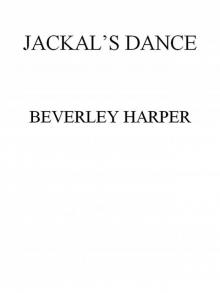 Jackal's Dance
Jackal's Dance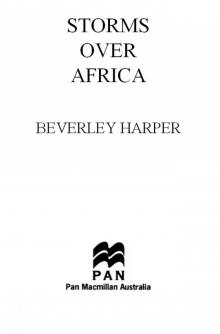 Storms Over Africa
Storms Over Africa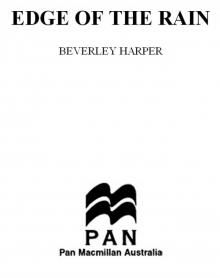 Edge of the Rain
Edge of the Rain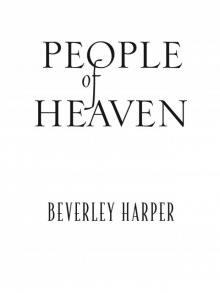 People of Heaven
People of Heaven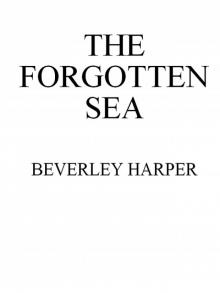 The Forgotten Sea
The Forgotten Sea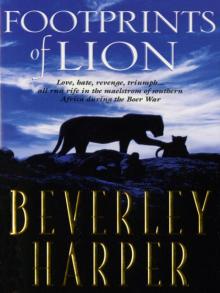 Footprints of Lion
Footprints of Lion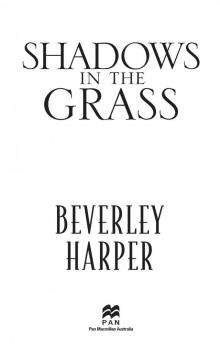 Shadows in the Grass
Shadows in the Grass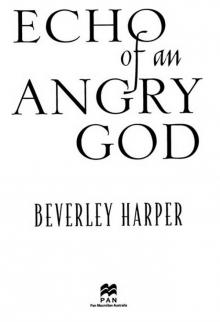 Echo of an Angry God
Echo of an Angry God